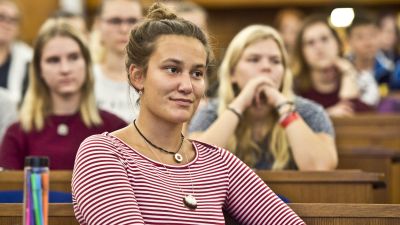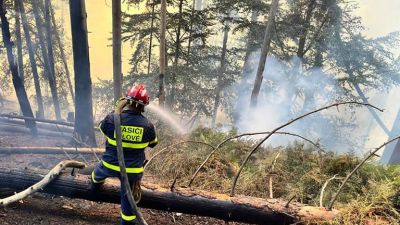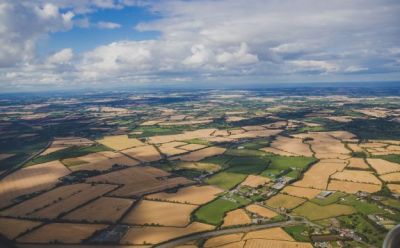In 1990, he became the first ever Czech Minister of the Environment and was a member of the Czech National Council and a senator. However, Professor Bedřich Moldan was also the founder of the Ecological Section of the Biological Society of the Czechoslovak Academy of Sciences, represented the Czech Republic at the United Nations and in 1992 founded of the Charles University Environment Centre (COŽP).
If we go back to the beginning, how and with what intent was the centre founded?
The credit belongs mainly to the late Professor Radium Palouš (who was rector of the university from 1990-1994). He was a man of broad outlook, with a great sense of social context. The idea of creating a university-wide centre focused on the environment appealed to him. Nothing stood in the way of incorporating the CEE into the university's organisational structure. It should be added that this was originally an activity that originated in the Faculty of Science at Charles University.
The centre started to work fully in 1992 and you became its head.
(with a smile) There were two of us in the selection process at that time, with me and Miloš Kužvart (Minister of the Environment of the Czech Republic in 1998-2002). The initial statute of the centre from the beginning has been to support environmental education and research, not only across faculties, but also outside the university. From the very beginning, even when the centre had only a handful of employees: besides myself, they were Mr. and Mrs. Dlouzí, Ivan Rynda and secretary Mrs. Vacková, and it was located in several rooms in the dormitories in Petrská Street in the Old Town - we have been an internationally oriented part of Charles University.
The first of the projects that the centre worked on was focused on economic instruments of environmental protection. The largest project was called Towards Sustainable Development of the Czech Republic: Creating Conditions (2002), which resulted in a five-volume "pentalogy", and the last part of the project - a comprehensive strategy for sustainable development - has a somewhat turbulent history...
Is it fair to say, at that time, that similar such "discoveries" stirred calmer waters within society?
So to speak, and actually not only those! Especially when it was considered that the material we were working on had ambitions to become a national strategy...
Let me make a small interjection: In 1997 the UN invited member states to submit their sustainable development strategies; they were to be presented at the World Summit on Sustainable Development in Johannesburg in 2002. We prepared extensive outputs and presented them to the Czech Government. Unfortunately, with the strong contribution of Minister Miloš Kužvart, who took the lead in the opposition, everything was cancelled. He and his team subsequently submitted their "own" strategy, but it was again "torn apart" by the inter-ministerial comment procedure. The result? The Czech Republic was one of the countries that got a 'bad mark' for not presenting itself at the summit. But we also developed a number of stimulating and successful projects...
The centre's lively and robust editorial work is undoubtedly one of them, isn't it?
It was a whole series of monographs, we called it the 'blue edition' - it was unified by a blue cover. For example, we managed to publish a set of almost a hundred university scripts on a wide range of environmental issues, which were used by all public Czech universities.
The centre soon began to focus on research itself. The original team of five people could not "keep up", could they?
We did not have our own research capacity, but we had an idea. Today, the centre is made up of about 50 experts working on current grants, mainly focused on environmental research. The vast majority of them are employees of Charles University, and they have a fixed-term contract - for the duration of the grant from which they draw research funds. Many of them are foreign experts. As for the original team, we are down to three of the original five.
What are you most proud of?
The projects are mostly in the field of environmental economics. Many of them have an international reputation and have been published in seminars, conferences or publications. One of the first events, for example, was an international conference on universities and sustainability organised in 1994. More recently, climate change has been successfully addressed in the context of environmental economics. We are involved in the European LIFE project; for example, we are evaluating ecosystems in one part of it.
I have personally advocated research on environmental indicators and sustainable development. We have published several books and written many scientific articles. And the centre is continuing its research, in sub-areas: we are mainly looking at environmental economics, sustainable development indicators, urban transport, product life cycles and others. The economist Markéta Sychrovská, the organisational heart of the centre, has an absolute overview; an interview with her would be worth a mega-article, she keeps everything in her head and has it incredibly organised in her files (with a smile). All in all, we are working on about 50 projects today.
Most of the faculty, I assume, are involved in these, not just a select few.
Absolutely. Under the university-wide COOPERATIO project (from 1 January 2022; originally Primary, then Progress), 43 disciplines are supported under four panels: humanities, social sciences, then natural sciences, mathematics and computer science, and medical sciences. I once looked through the individual projects and found that a good half of the faculties deal with aspects of the environment...
Of course, we cooperate the most with the Faculty of Science, where I personally ran the course Global Environmental Context for a long time - today I have my successor there, Vojta Kotecký (among others, a zoologist, publicist, member of the Government Council for Sustainable Development; and a graduate of the Faculty of Science). We also cooperate closely with the Faculty of Science of Charles University, in the matter of doctoral studies. Because we have the status of a university institute, which by definition cannot have its own students. We also have a longer-term cooperation with the Institute of Economic Studies of the Faculty of Economics of the Charles University.
|
|
You were also the Czech Republic's representative to the United Nations. How do you remember this experience?
It started with working with the organisation of a major summit on environment and development in 1992 in Rio de Janiero - the United Nations Conference on Environment and Development (UNCED), also known as the "Earth Summit". It was a huge event, attended by 172 governments of the world... Since then, I have held various positions in the UN. I was also an employee of the Ministry of Foreign Affairs, which sent me to all UN meetings. It was then that I managed to establish the cooperation with the United Nations Environment Programme (UNEP), which is still ongoing.
Professor, one cannot help but wonder what it was like when you became the first Minister of the Environment in 1990...
I remember that time often and intensely. The history of my appointment was rather strange: I had already ‘done something’. In 1978, I co-founded and became Vice-Chairman of the Ecological Section of the Czechoslovak Biological Society at the Czechoslovak Academy of Sciences. Of course, the chairman had to be a communist, but we were lucky, it was Professor Emil Hadač, a very decent person and a good botanist. At that time, we became famous for the very important so-called "Report for Štrougal”. It was in 1983 that we were approached by the government secretariat with the task of working out the state of the environment in Czechoslovakia. They wanted to know the realistic and true situation, and it was supposed to be a secret document. I decided the tasks among the leading experts and we prepared the report for the state leadership.
And at the end of November 1989, the then Prime Minister, František Pitra, invited me to a meeting. Before I had time to drink coffee at the secretary's, I ran into the minister's office, where I was told, “We have decided that there will be a Ministry of the Environment, and you will be the minister.” I agreed and a few days later attended a cabinet meeting where I was told that I would become a minister without portfolio, as the Ministry of Environment had yet to be created. My first task was to devise the content, tasks and composition of the Ministry. It was to be operational from 1 January 1990! We were based in Lazarská Street, and at that time, apart from me, the ministry was represented by three other people: lawyers Václav Mezřický, Eva Kružíková and secretary Gábina Vacková.
I guess those days must have been a bit “wild”?
It was hectic. We managed to draft a competency law, the basic form of which has been in force since 1969, but it has been continuously amended. At that time, for example, the Ministry of Forestry and Water Management or the Ministry of Construction and Building had to be abolished, the Czech Geological Survey was abolished, and so on. The then Czech National Council, which was actually the parliament, approved the competence law for the establishment of the Ministry of the Environment of the Czech Republic in about five days, exactly on 28 December 1989... You must admit that it is impossible to forget this.
Your career in the highest politics came to a halt. Why?
I fell under suspicion of having collaborated with the Communist era secret police (the StB). First, I was fired by the Czech National Council on the recommendation of a strange commission. There was no lustration law at that time, and dismissal was the "simplest" solution. It didn't help that I was defended by officials from universities all over the world, even the Federal Assembly, which already had its own Commission to investigate 17 November, lobbied for my exoneration...
I was, as has been pointed out to me countless times, a difficult case. I confess that I refused to read many of the reports of my associates and loved ones - I did not want to know who and what they had "found" and reported on me. Admittedly, after protracted obstruction and investigation, the accusation was proven beyond a reasonable doubt to be a lie. However, on a technicality, the resulting verdict of “did not collaborate” actually meant nothing.
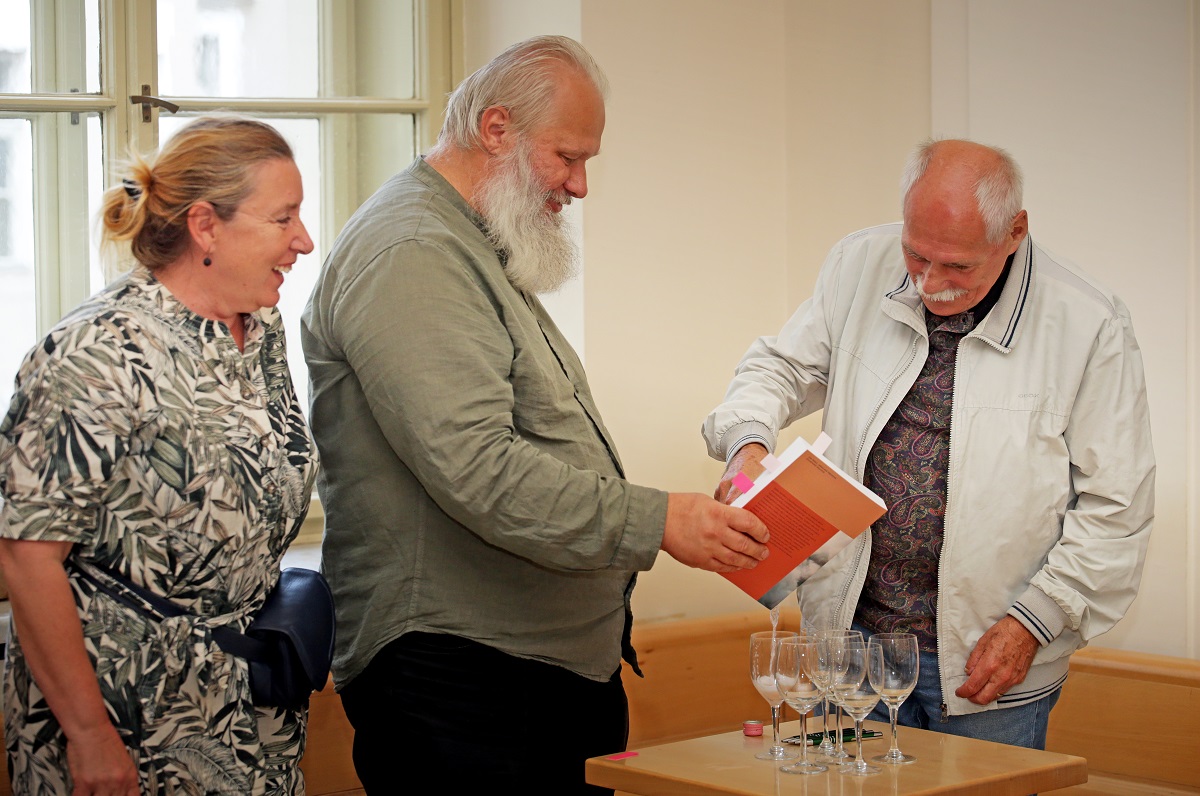 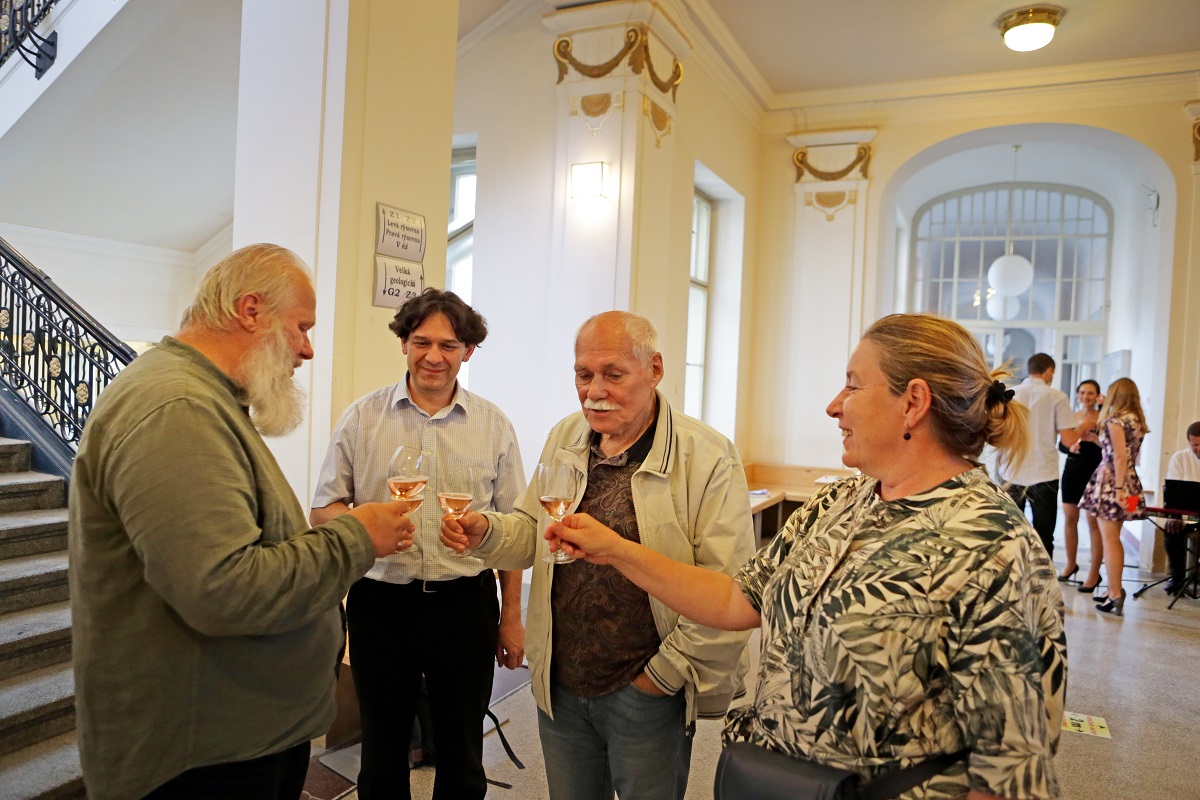 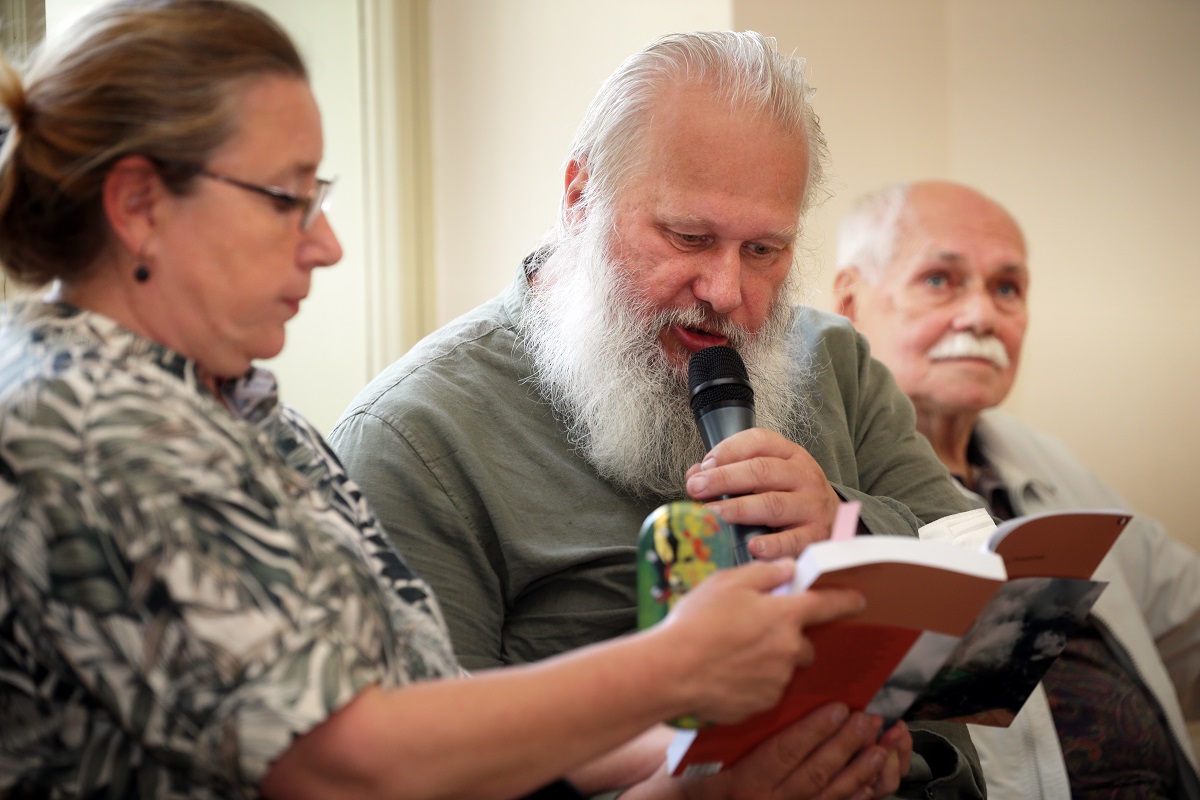 In September 2021, Professor Bedřich Moldan became the ‘godfather’ of the publication Applied Ecology, by Jan and Jaroslava Frouz. Petr Valo, the director of Karolinum Publishing House, which published the book, was also present at the book launch at the Faculty of Science of Charles University / Photo: Hynek Glos |
Today, you are still more or less the deputy director of the Centre for Environmental Issues…
I have only a small part-time job at the Centre and I participate in its activities as a speaker, occasionally with a lecture. It's been 10 years since I admitted to myself that I was “getting on in years and that someone younger should take over...”, so I made a deal with Professor Jan Frouz. I had to persuade him a little bit to apply for the tender, but I'm sure he doesn't regret it (with a smile). In addition to running the COŽP, he is the deputy director of the Institute for the Environment in the Faculty of Science. We meet regularly on various occasions. Behind him comes a great development of projects that are being dealt with at CU, it really is a whirlwind...
I don’t imagine you are "just" a retiree without activities anymore. What keeps you busy and entertained today?
I'm writing a personal memoir. Of course, my family occasionally appears in them, but the bulk of the book is my working life. I'm working on them with my colleague Eva Bobůrková and we're almost finished. But otherwise I enjoy the peace of visits and home; imagine that my wife and I (Dobrava Moldanová is a university professor of the history of Czech literature, she worked at the Department of Czech Studies and was also the Dean of the Faculty of Education at Jan Evangelista Purkyně University in Ústí nad Labem - editor's note) celebrated 66 years of life together a few months ago. We regularly and often go to Šumava, we go to a cottage. I like it there very much and thanks to the limited accessibility for tourists we enjoy almost absolute peace there.

▲ “It is not known exactly which saint the statue represents. I came across it in the region below Milešovka, where I wandered many years ago and discovered a number of statues in the open air. This is actually just a torso, the upper part is missing. I didn't like the fact that it was just lying there in a ditch with tractors running over it. So I decided that if I could, I wanted to have it. The local conservationists agreed,” Bedřich Moldan explains the fate of the sandstone statue fragment (said to be a knee).
| Profressor Bedřich Moldan |
| Bedřich Moldan was born in Prague, graduated from the Faculty of Mathematics and Physics of Charles University. He is a geochemist, ecologist, publicist and was a prominent politician who played an important role in the development of Czech environmental legislation after the overthrow of Czechoslovakia’s Communist regime in November 1989. He is a world-renowned expert in the field of analytical chemistry, biochemistry and the environment. He has influenced several generations of environmentalists through his extensive teaching, journalistic, organizational, political and diplomatic activities. In January 1990, he became the first ever Czechoslovak (and Czech) Minister of the Environment. Since 1991, he was also the Czech Ambassador to the United Nations, and has been involved in the organisation of a number of prestigious international conferences. He is the author of dozens of scientific monographs and articles on environmental protection, environmental education and research. |










